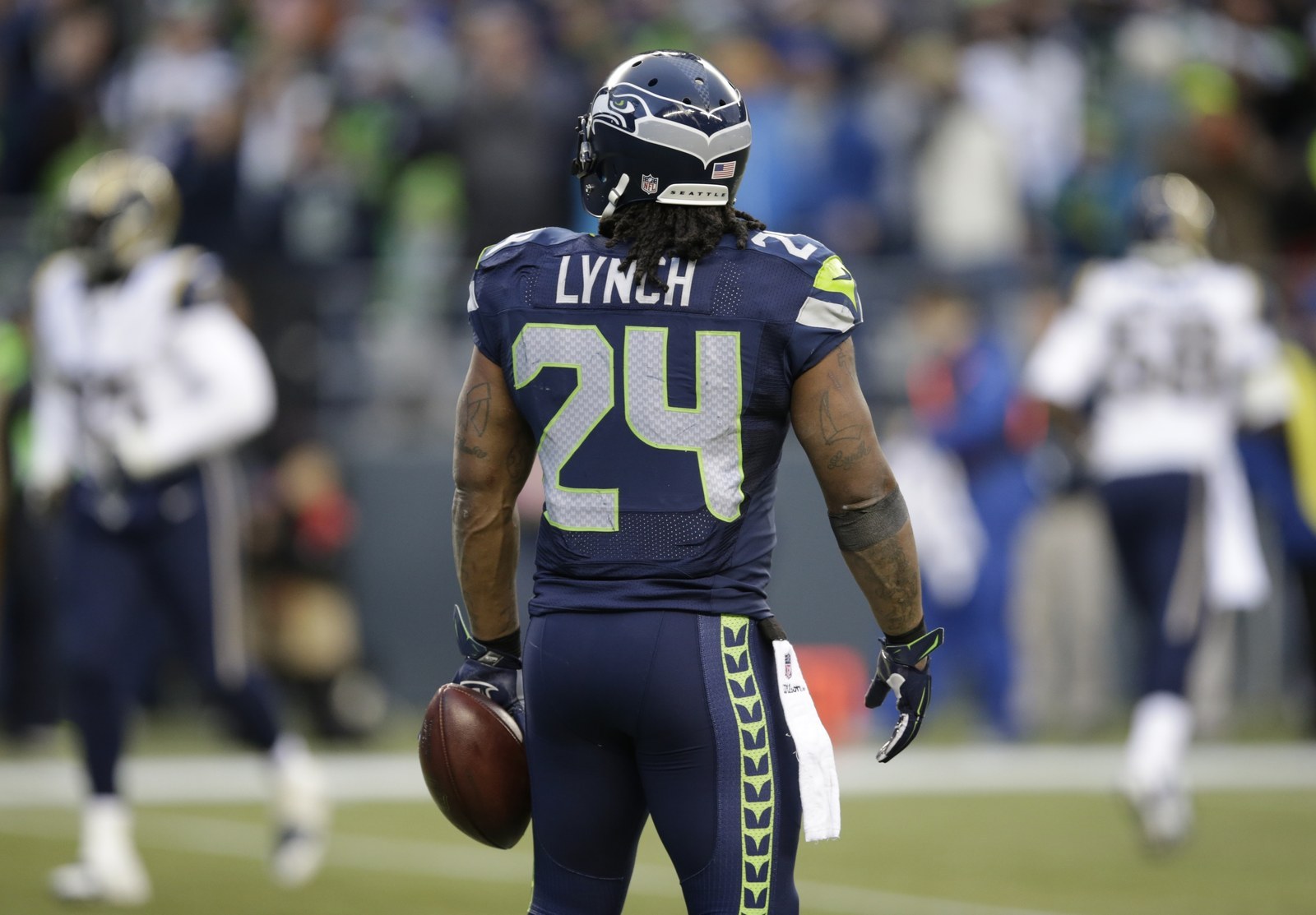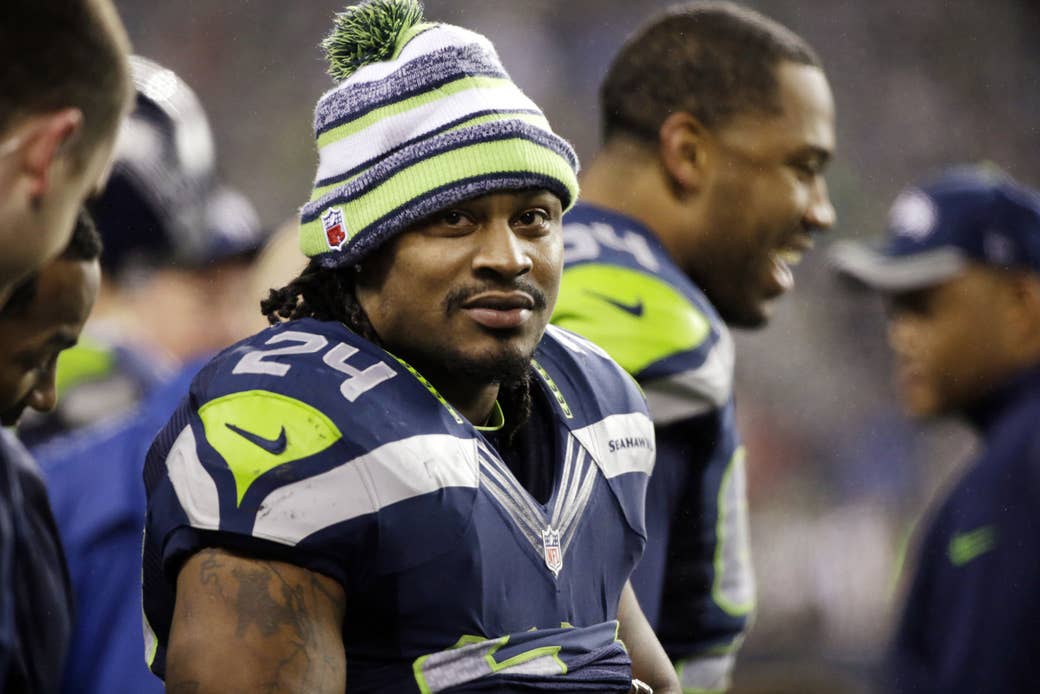
Marshawn Lynch is a “complete crybaby,” a “fool,” “ungrateful,” a “thug.”
Or he’s a national treasure, a marketing genius, or legend. Or maybe just an introvert.
Much has been written about Lynch’s reticence to speak to the press, especially in any NFL-facilitated capacity, since the running back moved to the Seattle Seahawks. But most of it has focused on parsing his motivations. Is he angry about his contract with the Seahawks? Battling anxiety about speaking in front of groups? Entitled, selfish, and ungrateful for the love his fans have bestowed upon him?
But what if Lynch’s refusal to play by the accepted rules of sports publicity are neither the sign of a “goon” or a “god.” What if they instead herald a new, negotiated mode of sports stardom? By responding to all press queries with the same comment (“I’m just here so I won’t get fined”), Lynch is essentially satirizing the bizarre performance of NFL Media Day, in which players perform the same banalities on endless loop. Say too much — or too loudly, or too brashly — and get criticized, as Lynch’s teammate Richard Sherman did last year; say too little, and incur a $50,000 fine. The only way to go, it seems, is calm, collected, and vanilla: a performance perfected by the New England Patriots' Tom Brady, now closing in on his sixth Super Bowl of Press.
Palatable, banal, boring: Those are the unspoken but ubiquitous adjectives of planned publicity, whether related to tech firms, Hollywood, or the NFL. They were forged and refined, however, in the gilded halls of the classic Hollywood studios, where massive publicity teams collaborated with the fan magazines and gossip columnists to create the beautifully wrought and essentially bullet-proof star images.
To be a movie star meant to sit still, smile big for publicity shows, and watch as press agents wove saccharine tales of your childhood and love life for public consumption. Throw in some discussion of ‘just gotta stay focused,’ ‘taking it one game at a time,’ and ‘both teams just played really hard,’ and you’ve got the contemporary sports publicity apparatus, tasked, as it is, with turning a spectacle of athleticism into a melodrama filled with heroes and villains.
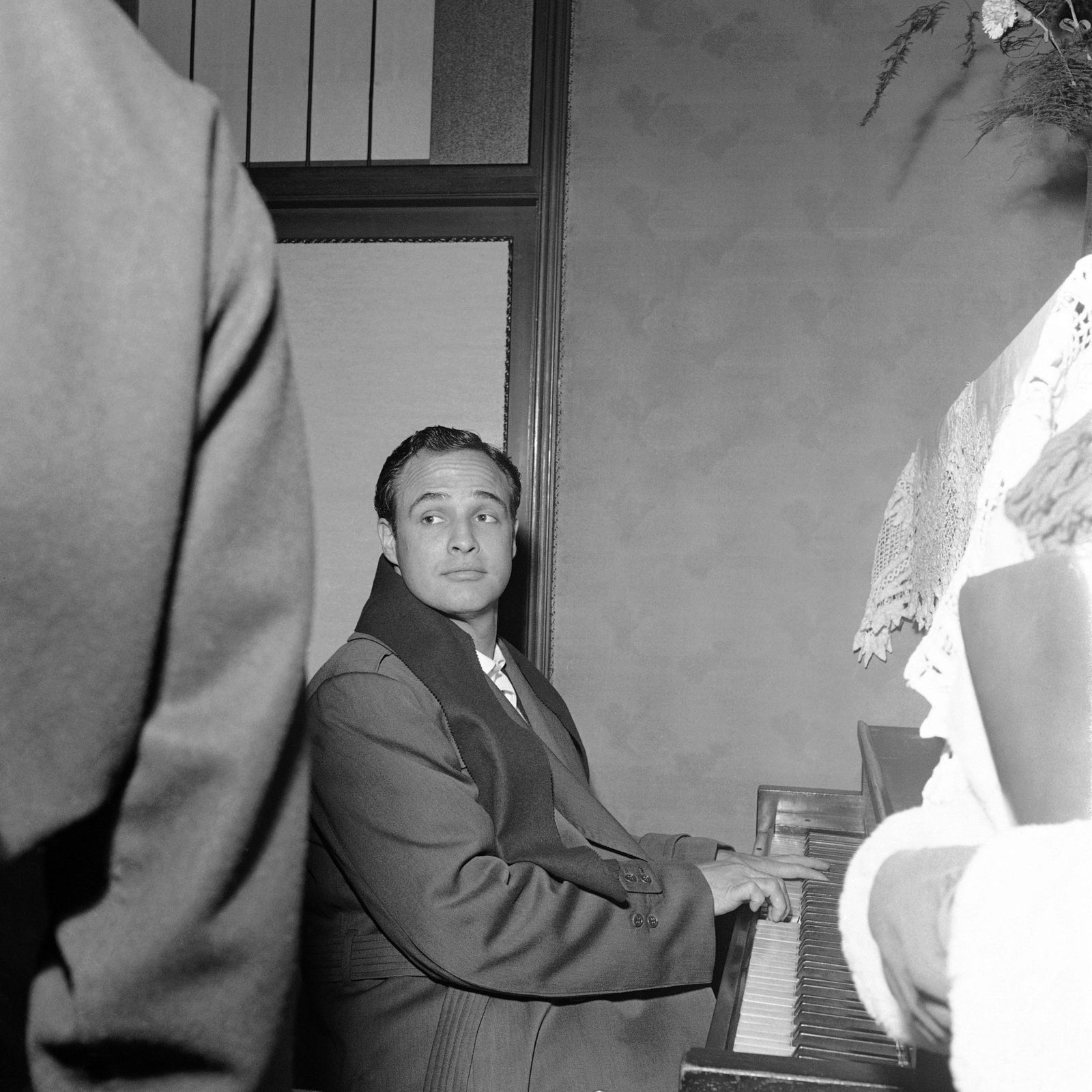
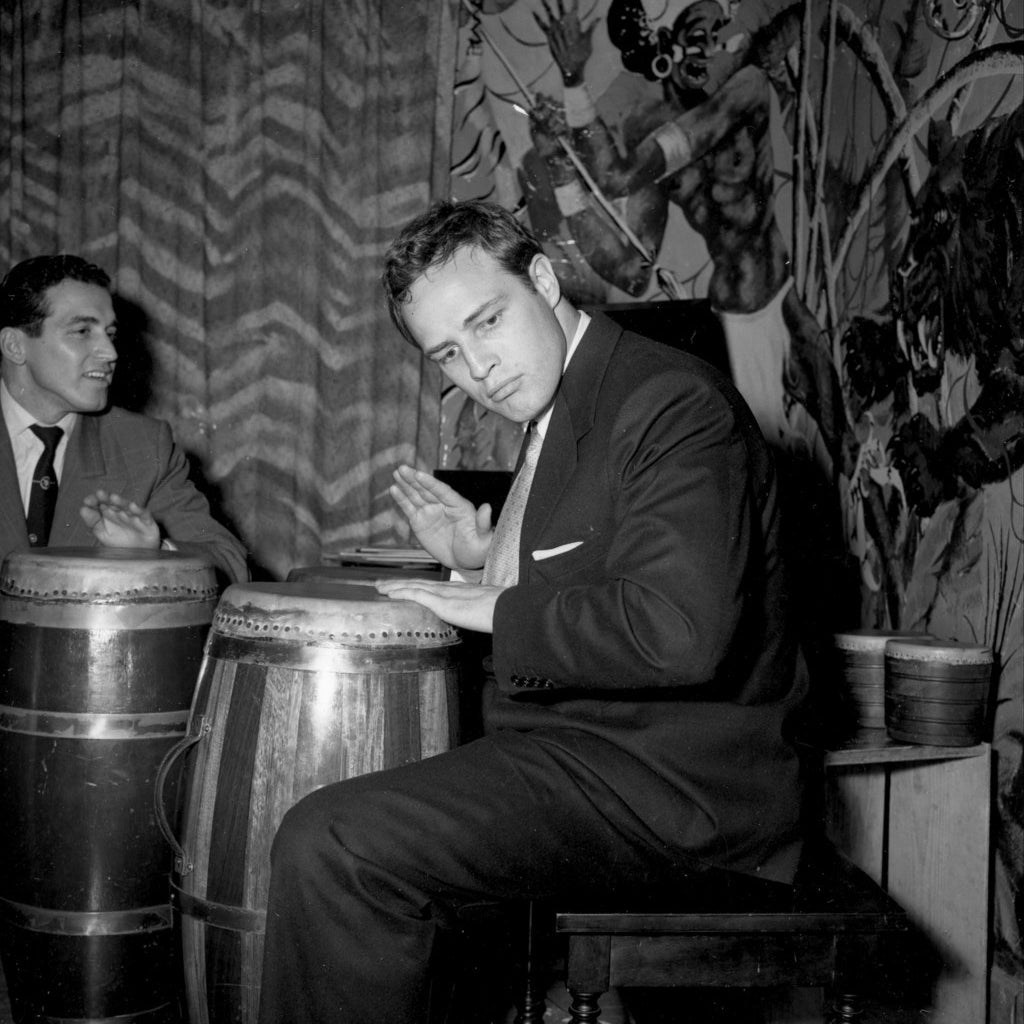
In the early 1950s, Marlon Brando disrupted that system. When he arrived in Hollywood from the New York stage, he prided himself on breaking the rules, wearing “dirty dungarees,” and refusing to be set up on dates with young starlets. He also refused to talk with fan magazines or gossip columnists, and without a studio contract, there was no one to force him to do so. This was a seismic change, made possible only by the slow collapse of the Hollywood studio system, and it enraged the gossip press, which had become unaccustomed to not getting its way. The more Brando refused their coverage of his personal life, opting to speak only about his performance, the more they wrote about that refusal. They hounded friends and co-stars for details about him, arguably generating more content to make up for his lack of participation than they would have with it.
You can see what’s happening here: The press, angry that a star wouldn’t give them what they considered their “right” as providers of publicity, use that refusal to turn fans against them. It’s a scenario that bears resemblance to the generalized attitude toward Lynch: How dare he disrupt the well-practiced, totally boring, yet supposedly mutually beneficial dance between the NFL and the media organizations that promote it and profit from it?
It wasn’t that Brando hated all publicity: This was a man, after all, who made a best friend out of a pet raccoon. He didn’t hate his fans, he didn’t hate his craft. He just loathed the way the fan magazines flattened his image into a series of cheap melodramas, pivoting endlessly on loves found and lost. He loved acting, and his peers, and when they voted to award him Best Actor in 1954 for his performance in On the Waterfront, he traded in his jeans for a tux and even posed nicely next to Grace Kelly backstage. Brando’s success, not only as an actor, but a star operating outside of the system, encouraged other stars, once liberated from their studio contracts, to take a similar tack.
Brando’s refusal to participate with the fan mags and gossip columns — and their frenzied reaction to that refusal — telegraphed their irrelevance. In the same way, Lynch’s refusal, coupled with the rise of Twitter, the decline of traditional sports outlets like Sports Illustrated, and the power of TMZ Sports, speaks to an overarching shift in the way that information about sports is disseminated and consumed. Even the continuing relevance of ESPN hinges less on its commentary or journalism, but on its ability to secure broadcast rights to actual games, whose viewership has never been higher.
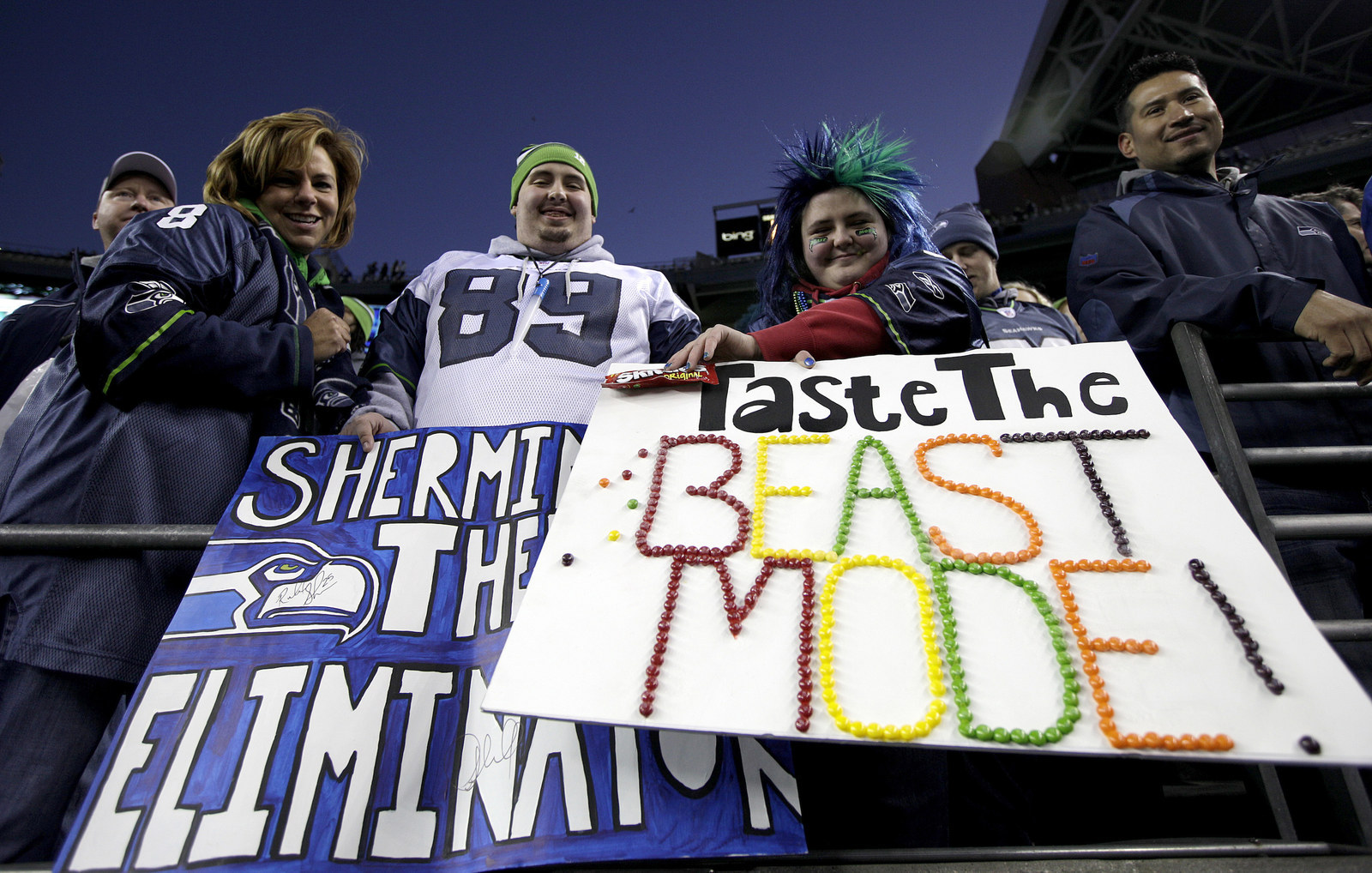
Which isn’t to say that publicity is dead. Like Brando, Lynch doesn’t hate all publicity: He plays with the form in his hilarious Skittles press conference, he trademarked his nickname (“Beast Mode”), he went on Japanese television to taste local candies, he plays Mortal Kombat X with Conan O’Brien and admits that “I’m a button masher FOR SURE.” Back in 2012, he let Sports Illustrated accompany him to Oakland to talk about his philanthropic work with youth in the area, talking briefly about his struggles as a child, but he’s not married, doesn’t have kids, and doesn’t talk about his personal life, other than to repeat the story of how he came to start eating Skittles during the game. An extensive SI piece from last month cobbled together reports from teammates to paint a portrait of a fiercely private and principled man: the type of guy who invites a disadvantaged Seattle youth to every game but never lets the press cover it, whom everyone seemingly calls “the best teammate I’ve ever had.”
Lynch opts not to allow the serious and important work of his life — the substantive work with his foundation, the friendships that underlie his career — be turned into a three-minute reel to be played during the pre-game. “If you’re forced to do something, it’s not as good as if you choose to do it” — that’s what Lynch said before last year’s Super Bowl. Some choose to read that attitude as petulant or spoiled. But it’s also possible to read it as the words of someone who not only sees the publicity apparatus for what it is — toothless, exploitative, often insidiously racist — but acts on that vision.
Some, like California Lt. Gov. Gavin Newsom, call it “authentic.” You might also call it integrity, especially given the abject failure of the mainstream media to serve any role approximating a “check and balance” amid the NFL’s subterfuges when it comes to player misbehavior and abuse.
Maybe Lynch follows the trajectory of Brando, who mired himself in his own ego and spiraled into bloat and decay, or other stars, from Daniel Day-Lewis to Meryl Streep, who are simultaneously the best at their profession and most particular about the type and tenor of publicity they perform. The way we talk about Day-Lewis and Streep is strictly in terms of superlatives: the most Oscars, the most talented. We focus on their performances because, with a lack of personal drama up for public consumption, that’s all that’s left to consider. The less mediation, it seems, the more serious we take them and their achievement.
It’s not difficult to imagine that Lynch simply wants some version of the same. Or, in the single phrase he offered the press this past Wednesday: “You know why I’m here.”
